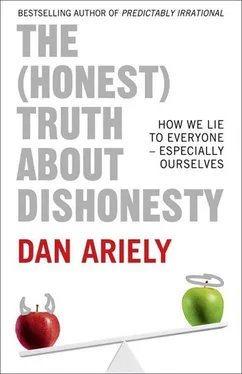Ariely, Dan - The (Honest) Truth About Dishonesty - How We Lie to Everyone – Especially Ourselves
Здесь есть возможность читать онлайн «Ariely, Dan - The (Honest) Truth About Dishonesty - How We Lie to Everyone – Especially Ourselves» весь текст электронной книги совершенно бесплатно (целиком полную версию без сокращений). В некоторых случаях можно слушать аудио, скачать через торрент в формате fb2 и присутствует краткое содержание. Жанр: Старинная литература, на английском языке. Описание произведения, (предисловие) а так же отзывы посетителей доступны на портале библиотеки ЛибКат.
- Название:The (Honest) Truth About Dishonesty: How We Lie to Everyone – Especially Ourselves
- Автор:
- Жанр:
- Год:неизвестен
- ISBN:нет данных
- Рейтинг книги:4 / 5. Голосов: 1
-
Избранное:Добавить в избранное
- Отзывы:
-
Ваша оценка:
- 80
- 1
- 2
- 3
- 4
- 5
The (Honest) Truth About Dishonesty: How We Lie to Everyone – Especially Ourselves: краткое содержание, описание и аннотация
Предлагаем к чтению аннотацию, описание, краткое содержание или предисловие (зависит от того, что написал сам автор книги «The (Honest) Truth About Dishonesty: How We Lie to Everyone – Especially Ourselves»). Если вы не нашли необходимую информацию о книге — напишите в комментариях, мы постараемся отыскать её.
The (Honest) Truth About Dishonesty: How We Lie to Everyone – Especially Ourselves — читать онлайн бесплатно полную книгу (весь текст) целиком
Ниже представлен текст книги, разбитый по страницам. Система сохранения места последней прочитанной страницы, позволяет с удобством читать онлайн бесплатно книгу «The (Honest) Truth About Dishonesty: How We Lie to Everyone – Especially Ourselves», без необходимости каждый раз заново искать на чём Вы остановились. Поставьте закладку, и сможете в любой момент перейти на страницу, на которой закончили чтение.
Интервал:
Закладка:
Of course, we can’t instantly believe every one of our lies. For instance, let’s say you’re a guy at a speed-dating event and you’re trying to impress an attractive woman. A wild idea enters your mind: you tell her that you have a pilot’s license. Even if you sold her this story, it’s unlikely you will convince yourself that you do, in fact, have such a license and start suggesting to the pilots on your next flight how to improve their landings. On the other hand, let’s say you go out running with your buddy and you get into a discussion about best running times. You tell your friend that you’ve run a mile in under seven minutes, when in reality your best time was a tiny bit over seven minutes. A few days later, you tell someone else the same thing. After repeating this slightly exaggerated claim over and over, you could eventually forget that you hadn’t actually broken the seven-minute mark. You may come to believe it to such a degree that you might even be willing to bet money on it.
ALLOW ME TOtell you a story of a time when I embraced my own deception. In the summer of 1989—about two years after I left the hospital—my friend Ken and I decided to fly from New York to London to see another friend. We bought the cheapest flight to London, which happened to be on Air India. When the taxi dropped us off at the airport, we were dismayed to see a line of people trailing all the way out of the terminal. Thinking fast, Ken came up with an idea: “Why don’t we put you in a wheelchair?” I thought about his suggestion. Not only would I be more comfortable, but we could also get through much faster. (Truthfully speaking, it is difficult for me to stand for a prolonged time because the circulation in my legs is far from good. But I don’t need a wheelchair.)
We were both convinced that it was a good plan, so Ken jumped out of the cab and returned with the wheelchair. We breezed through check-in and, with an extra two hours to kill, we enjoyed coffee and a sandwich. But then I needed to use the restroom. So Ken pushed me in the wheelchair to the nearest bathroom, which unfortunately was not designed to accommodate a wheelchair. I maintained my role, though; we got the wheelchair as close to the toilet as possible and I tried to hit the mark from a distance, with limited success.
Once we made it through the bathroom challenge, it was time to board the plane. Our seats were in row 30, and as we neared the entrance to the plane, I realized that the wheelchair was going to be too wide for the aisle. So we did what my new role dictated: I left the wheelchair at the entrance of the plane, grabbed on to Ken’s shoulders, and he hauled me to our seats.
As I sat waiting for the flight to take off, I was annoyed that the bathroom in the airport wasn’t handicap-accessible and that the airline hadn’t provided me with a narrower wheelchair to get to my seat. My irritation increased when I realized that I shouldn’t drink anything on the six-hour flight because there would be no way for me to keep up the act and use the bathroom. The next difficulty arose when we landed in London. Once again, Ken had to carry me to the entrance of the plane, and when the airline didn’t have a wheelchair waiting for us, we had to wait.
This little adventure made me appreciate the daily irritations of handicapped people in general. In fact, I was so annoyed that I decided to go and complain to the head of Air India in London. Once we got the wheelchair, Ken rolled me to Air India’s office, and with an overblown air of indignation I described each difficulty and humiliation and reprimanded the regional head of Air India for the airline’s lack of concern for disabled people everywhere. Of course he apologized profusely, and after that we rolled away.
The odd thing is that throughout the process I knew I could walk, but I adopted my role so quickly and thoroughly that my self-righteousness felt as real as if I had a legitimate reason to be upset. Then after all that, we got to the baggage claim, where I simply picked up my backpack and walked away un-hampered, like Keyser Söze in the film The Usual Suspects .
TO MORE SERIOUSLYexamine self-deception, Zoë Chance (a postdoc at Yale), Mike Norton, Francesca Gino, and I set out to learn more about how and when we deceive ourselves into believing our own lies and whether there are ways to prevent ourselves from doing so.
In the first phase of our exploration, participants took an eight-question IQ-like test (one of the questions, for example, was this: “What is the number that is one half of one quarter of one tenth of 400?”). After they finished taking the quiz, participants in the control group handed their answers over to the experimenter who checked their responses. This allowed us to establish the average performance on the test. *
In the condition where cheating was possible, participants had an answer key at the bottom of the page. They were told that the answer key was there so that they could score how well they did on the test and also to help them estimate in general how good they were at answering these types of questions. However, they were told to answer the questions first and only then use the key for verification. After answering all the questions, participants checked their own answers and reported their own performance.
What did the results from phase one of the study show? As we expected, the group that had the opportunity to “check their answers” scored a few points higher on average, which suggested that they had used the answer key not only to score themselves but also to improve their performance. As was the case with all of our other experiments, we found that people cheat when they have a chance to do so, but not by a whole lot.
Helping Myself to a Higher MENSA Score
The inspiration for this experimental setup came from one of those complimentary magazines that you find in seat-back pockets on airplanes. On one particular flight, I was flipping through a magazine and discovered a MENSA quiz (questions that are supposed to measure intelligence). Since I am rather competitive, I naturally had to try it. The directions said that the answers were in the back of the magazine. After I answered the first question, I flipped to the back to see if I was correct, and lo and behold, I was. But as I continued with the quiz, I also noticed that as I was checking the answer to the question I just finished solving, my eyes strayed just a bit to the next answer. Having glanced at the answer to the next question, I found the next problem to be much easier. At the end of the quiz, I was able to correctly solve most of the questions, which made it easier for me to believe that I was some sort of genius. But then I had to wonder whether my score was that high because I was supersmart or because I had seen the answers out of the corner of my eye (my inclination was, of course, to attribute it to my own intelligence).
The same basic process can take place in any test in which the answers are available on another page or are written upside down, as they often are in magazines and SAT study guides. We often use the answers when we practice taking tests to convince ourselves that we’re smart or, if we get an answer wrong, that we’ve made a silly mistake that we would never make during a real exam. Either way, we come away with an inflated idea of how bright we actually are—and that’s something we’re generally happy to accept.
THE RESULTS FROMphase one of our experiments showed that participants tended to look ahead at the answers as a way to improve their score. But this finding did not tell us whether they engaged in straight-up old-fashioned cheating or if they were actually deceiving themselves. In other words, we didn’t yet know if the participants knew they were cheating or if they convinced themselves that they legitimately knew the correct answers all along. To figure this out, we added another component to our next experiment.
Читать дальшеИнтервал:
Закладка:
Похожие книги на «The (Honest) Truth About Dishonesty: How We Lie to Everyone – Especially Ourselves»
Представляем Вашему вниманию похожие книги на «The (Honest) Truth About Dishonesty: How We Lie to Everyone – Especially Ourselves» списком для выбора. Мы отобрали схожую по названию и смыслу литературу в надежде предоставить читателям больше вариантов отыскать новые, интересные, ещё непрочитанные произведения.
Обсуждение, отзывы о книге «The (Honest) Truth About Dishonesty: How We Lie to Everyone – Especially Ourselves» и просто собственные мнения читателей. Оставьте ваши комментарии, напишите, что Вы думаете о произведении, его смысле или главных героях. Укажите что конкретно понравилось, а что нет, и почему Вы так считаете.












